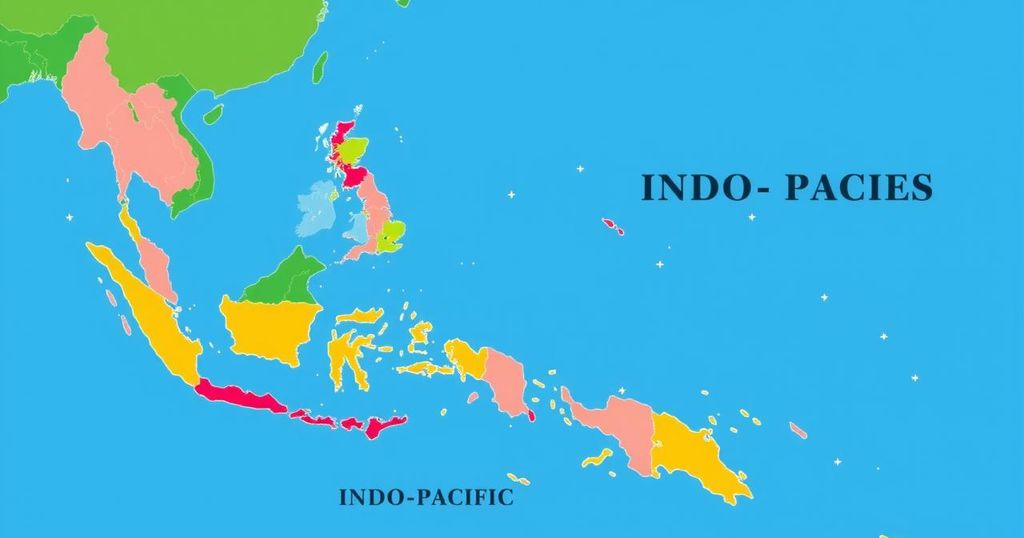Politics
- PACIFIC, ASIA -, ATLANTIC COUNCIL, BIDEN, BILL HAYTON, CHATHAM HOUSE, GEO, GEOPOLITICS, HE, HEGSETH, INDO - PACIFIC, JOE BIDEN, JOSH LIPSKY, NATO, NORTH AMERICA, PETE HEGSETH, PROGRAM, SOUTH CHINA SEA, SOUTH CHINA SEA DISPUTE, TERRITORIAL DISPUTE, TERRITORIAL DISPUTES, TRUMP, UNITED STATES, US, US-CHINA RELATIONS, WASHINGTON, XI
Dante Raeburn
China’s Strategic Maneuvering in the Indo-Pacific Amidst US Policy Shifts
China is asserting its influence in the Indo-Pacific, warning Japan about Taiwan and exploiting concerns regarding US reliability under Trump. Xi seeks to weaken US alliances while presenting military and diplomatic strategies. As the situation unfolds, the responses from Asian nations are crucial in determining the balance of power in the region.
China, under President Xi Jinping, is escalating its efforts to establish dominance in the Indo-Pacific region. A recent warning was issued relating to Taiwan, cautioning Japan against any perceived support for separatist movements, despite Japan’s official stance of non-recognition of Taipei.
Concerns have surged regarding the reliability of the United States as a security partner in Asia, particularly amid President Donald Trump’s relationships with Russia, skepticism towards NATO allies, and implementation of tariffs that negatively impact allied nations. Trump has suggested Taiwan should increase its defense spending, contested the US security pact with Japan, and imposed metal tariffs on South Korea and Australia.
Amidst these tensions, Xi’s moves create an opening to weaken US alliances. As Beijing seeks to mitigate the impact of Trump’s 20% tariff increases, they are tactically navigating diplomatic waters, voicing opposition to US alliances while maintaining actions that avoid provoking retaliation from the US,
Bill Hayton, an associate fellow at Chatham House, observed, “The Chinese state is pushing in every direction and just seeing how far it can go.” This approach illustrates China’s broader strategy to dissuade nations from siding with the US on sensitive issues, including Taiwan’s status and territorial disputes in the South China Sea.
As Asia prepares for Trump’s forthcoming tariffs, Defense Secretary Pete Hegseth is set to visit the Philippines and Japan, aiming to reassure these allies of US support while reiterating Trump’s calls for increased defense spending by Asian partners. Josh Lipsky of the Atlantic Council notes that the primary focus of the Trump administration is trade, contrasting with the Biden administration’s national security-centric approach.
Former President Biden enhanced US alliances in Asia to counter China’s expansion. Key actions included hosting significant trilateral summits and asserting a commitment to defend Taiwan from potential Chinese aggression, challenging decades of US policy ambiguity.
The response from Asian nations towards China’s assertiveness has been measured. For instance, Prime Minister Anthony Albanese of Australia highlighted the heavy impact of trade on local employment, noting that China remains a critical trade partner. Furthermore, Thailand sought to avoid repercussions by deporting Uyghur individuals back to China despite international criticism.
China’s current tactics of pushing boundaries stand in stark contrast to its diplomatic overtures preceding Trump’s election, which included fostering improved relations with Australia and Japan. The aggressive stance now raises questions about whether such actions contradict China’s strategy of disrupting US alliances.
Experts like Drew Thompson from the S. Rajaratnam School of International Studies pointed out the presence of differing strategies within China, weighing the efficacy of diplomacy against military force. Recently, countries like Cambodia have received aid from China aimed at replicating US initiatives that were halted, indicating a shift in influence processes in the region.
Kishore Mahbubani, former Singaporean ambassador to the UN, remarked that while Asian countries desire continued US engagement, they seek stability in US policy rather than erratic shifts. On a parallel front, discussions between US Senator Steve Daines and Chinese officials in Beijing highlighted a focus on trade issues rather than pressing diplomatic ones.
Michael Vatikiotis from the Centre for Humanitarian Dialogue emphasized that while Trump is reluctant to concede influence to China in Asia, his primary concern seems centered on economic profits and deals rather than strategic dominance. As negotiations approach, it is anticipated that Xi may prioritize demands regarding Taiwan, to which Trump may acquiesce.
In conclusion, China’s assertive behavior in the Indo-Pacific under President Xi Jinping demonstrates a strategic bid to exploit perceived vulnerabilities in US alliances amidst the complex diplomatic landscape shaped by President Trump’s actions. The immediacy of trade and defense issues suggest a pivotal moment for regional allies who must navigate the tension between a rising China and an unpredictable United States. As China engages in both diplomatic and military posturing, the response from Asian countries will be critical in shaping future geopolitical developments.
Original Source: m.economictimes.com








Post Comment